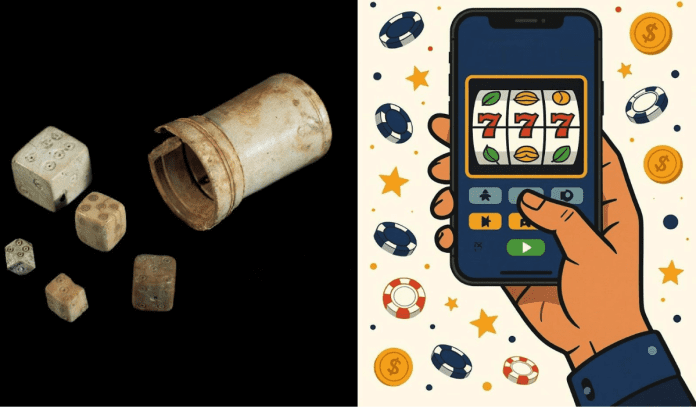Introduction: A Timeless Human Thrill
Gambling has long been woven into the fabric of human society, appearing in many cultures from the very start of civilization. People were putting to use some of their first writing, sculpting, and painting skills to produce ancient games that don’t fall much behind nowadays ones, at least in fundamentals. They all seek to captivate our innate fascination with the interplay of risk and reward, offering an exhilarating and engaging pastime.
What began as rudimentary games with the roll of carved bones in ancient campsites among early civilizations has blossomed into a multi-billion-dollar global industry. With virtually thousands of casinos vying for attention. In such a crowded landscape, a reliable review platform like Abasamia Wins – casino reviews becomes essential for navigating the world of online gaming of today.
Ancient Origins: The Dawn of Chance
The story of gambling predates written history, with archaeological evidence pointing to its practice as far back as 3000 BCE. In ancient Mesopotamia, clay tablets describe games of chance played with knucklebones from sheep, precursors to modern dice. These early wagers weren’t mere pastimes; they often carried social or ritual significance, with losers facing everything from fines to ritualistic forfeits. As civilizations flourished, so did the sophistication of these games. Egyptians etched backgammon-like boards on tomb walls, while in China, rudimentary lotteries funded massive public works like the Great Wall.
By the time of the Greeks and Romans, gambling had permeated daily life, from soldierly dice games during lulls in battle to high-stakes wagers at chariot races. Emperor Claudius was notorious for his love of dice, even writing a book on the subject. Yet, it was in this era that gambling’s dual nature emerged: a source of communal joy, but also of debt and discord.
Medieval and Renaissance Gambles: From Taverns to Royal Courts
As the Middle Ages unfolded, gambling found fertile ground in Europe’s feudal societies. Knights rolled dice to pass rainy nights in castles, while traveling merchants introduced card games from the East, tarot cards, originally for divination, soon doubled as gambling tools. The Church condemned it as a vice, yet popes themselves were known to indulge, underscoring its irresistible pull. Lotteries emerged as a sanctioned form, with England’s Queen Elizabeth I chartering the first national one in 1566 to fund public projects, proving gambling’s potential as a fiscal tool.
How analytics are growing in importance in basketball
The Renaissance brought refinement and risk. In Venice’s ridotti, masked nobles bet fortunes on everything from animal fights to poetic duels. This period also saw the birth of regulated casinos, like the Ridotto in 1638, where the state controlled play to curb underground excesses. Across the Atlantic, Native American tribes incorporated games like chuck-a-luck into tribal rituals, laying the groundwork for gambling’s role in colonial economies.
The Modern Era: Vegas Lights and Global Expansion
The 19th and 20th centuries transformed gambling from a scattered pursuit into an organized powerhouse. Riverboat casinos dotted the Mississippi, fueling America’s Wild West lore, while Monte Carlo’s opulent halls in 1863 epitomized European glamour. The pivotal moment came in 1931 when Nevada legalized casino gambling, birthing Las Vegas as the entertainment capital. What started as a desert outpost exploded into a neon-lit empire, drawing millions with promises of instant wealth amid shows and spectacles.
Post-World War II, lotteries proliferated worldwide to bolster welfare states. New Hampshire’s 1964 revival kicked off a U.S. boom. Sports betting surged too, with bookies evolving into regulated syndicates. By the late 20th century, gambling was no longer taboo; it was mainstream, contributing billions to economies while sparking debates on addiction and ethics.
The Online Revolution: Gambling Goes Digital
The internet’s arrival in the 1990s ignited gambling’s most dramatic shift. Antigua and Barbuda issued the first online gambling license in 1994, and by 1996, InterCasino launched as the inaugural virtual casino, offering slots and blackjack from anywhere with a dial-up connection. This digital pivot democratized access, no more smoky rooms or travel required, propelling the industry from niche to ubiquitous. Mobile apps and cryptocurrencies further accelerated growth, with live dealer streams mimicking brick-and-mortar immersion.
In Africa, particularly Kenya, this online surge has been meteoric. As of 2025, the Kenya Revenue Authority reported a staggering KSh 13 billion in betting tax revenue for the 2024/2025 fiscal year, reflecting a 117.2% surge and underscoring the sector’s economic clout amid rising player numbers. With smartphones ubiquitous, Kenyan youth are leading the charge, turning mobile betting into a cultural staple that blends tradition with tech.
Conclusion
The history of gambling from etched stones in Sumerian ruins to algorithms powering AI-driven poker bots illustrates an unyielding human drive for uncertainty’s thrill. As we stand in the online era, the industry’s innovations promise inclusivity and excitement, yet they demand vigilant regulation to safeguard players. What the future holds is not certain just yet, but it is very possible that gambling will continue to grow pretty much all around the world, in Kenya, too. Especially the sports betting segment of the industry, being so popular almost a cultural phenomenon.








